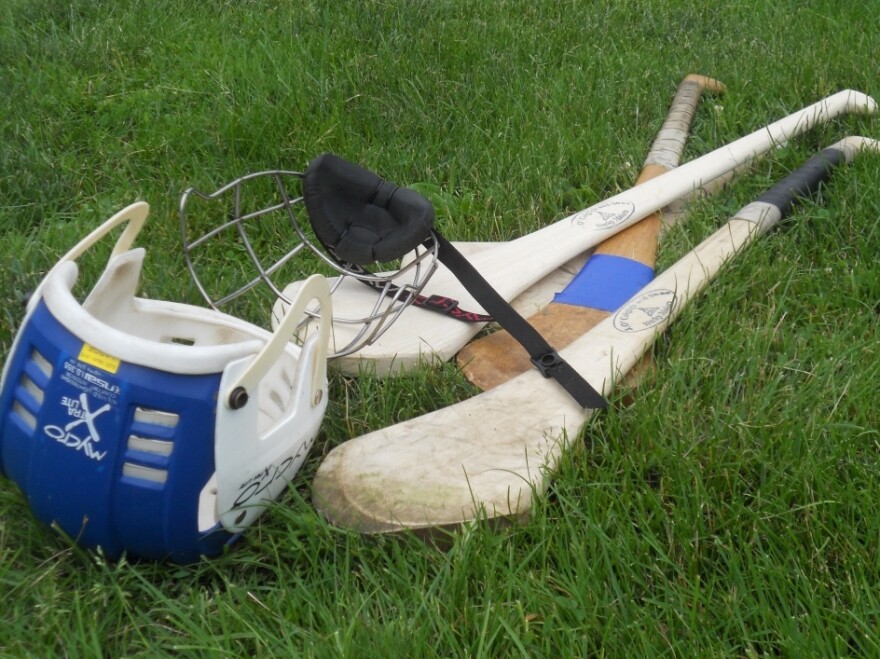One of the most popular sports in Ireland is the rough contact game of hurling.
It was created by ancient Celtic warriors, and now it's found a niche following among some soldiers in the U.S. A group of National Guardsmen in New Hampshire formed a hurling team to stay in shape after Middle East deployments.
But they're getting a lot more than exercise.
It's Like Stepping Off Of Battle
Hurling — not to be confused with the winter sport of curling — is a combination of football, ice hockey and lacrosse. Picture guys in helmets with sticks: They use the flat end to whack a fist-sized ball up the field, on the ground or in the air. There's checking, a lot of scrambling for the ball, and sprinting — and the pitch is even longer than a football field.
Celtic warriors brought this high-contact field sport to Ireland thousands of years ago. But its physical intensity and fast pace still attract soldiers today.
Some part of me really needed that small team environment. That player who has the same jersey as I have, I know he's there, I know he has my back.
"I've said that stepping off the pitch is something like stepping off the field of battle or coming off a mission," says National Guard Capt. Rob Burnham, who is a member of the Barley House Wolves, a hurling club in Concord, N.H.
He says more than half of his teammates are combat veterans.
"It's something healthy, something physical that allows you to blow off some steam. And something to look forward to that's different than being member of, say, the VFW [Veterans of Foreign Wars]," he says.
The team was founded in 2006 by National Guard soldiers from Charlie Company, 3rd Battalion of the 172nd Mountain Infantry — based in New Hampshire. On their way home from a deployment to Iraq, they saw a hurling match on TV in an Irish airport.
"We were like, what is that sport? Someone said, 'Oh that's hurling.' It just kind of called out to us," says Lt. Col. Ray Valas, one of the team's founders.
'This Changed My Life'
Valas says it seemed like a good way for his unit to keep in touch and stay in shape. But as the team grew to include other military branches, it started to mean something more.
"I recently had a guy that's played for a few years come up to me and say, 'You know, I never mentioned this to you, but I just wanted to thank you for getting this club started.' I said, 'No sweat.' 'No,' he said, 'you don't understand. After Afghanistan, I had a really rough time, and this changed my life.' "
Sgt. 1st Class Roy Lowes chokes up as he relays the story.

"When I came up to Ray and told him that, I think that moment was ... it took being on the hurling team for me to understand some of my own, um, psychological — I guess — maybe, needs."
Lowes deployed to Afghanistan in 2004 as a combat medic to help train Afghan soldiers. He says that because of the constant danger, he felt safe only with people he knew he could trust.
"I wish there was a way I could just go, click, switch it off, you know, as you take your uniform off, that you shed that. But you can't. I'm a lot better now, but when I first got back, I couldn't stand in line in Walmart for more than a couple minutes, and I had to leave," he says.
Lowes says he was jumpy and aggressive for months. Then he heard about the Barley House Wolves.
"Some part of me really needed that small team environment," he says. "That player who has the same jersey as I have, I know he's there, I know he has my back, I don't have to think about it, I don't have to second-guess anything."
Lowes says now he gets stressed out when he can't make it to practice. And his other teammates can relate. On a recent deployment to Kuwait, some of them missed hurling so much that they formed a new chapter of the Barley House Wolves on the base.
And while hurling is a men's sport, there is a women's version called Camogie. The Barley House Wolves say they're helping their female comrades in New Hampshire start a team of their own.
Copyright 2011 New Hampshire Public Radio


